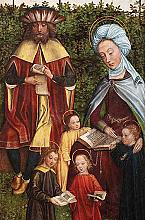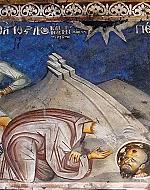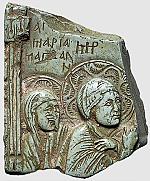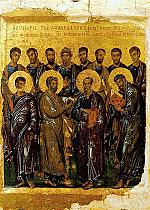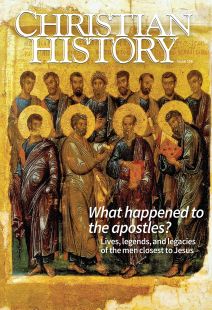Replacing Judas
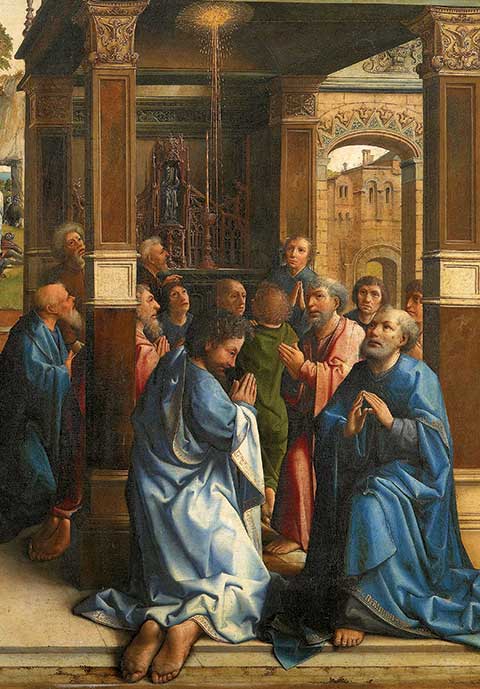
[ABOVE: Bernard van Orley, Detail from Altarpiece of Saints Thomas and Matthias, 1510 to 1520. Oil on Panel. Kunsthistorisches Museum, Vienna—Public doman, Wikimedia]
What is in a number? For those who believed the Law, the Prophets, and the Writings (what we know as the Old Testament today) and awaited the coming Messiah, the number 12 held great theological purpose. A symbol of completion and perfection in the Scriptures, the number related directly to God’s redemptive plan for his people, most pointedly seen at the time in the 12 tribes of Israel. Jesus Christ, in his earthly ministry, selected 12 disciples, which his Jewish followers would have recognized as no accident.
But when Judas Iscariot betrayed Jesus and lost his place among the Twelve, many of those who were in the Upper Room, as described in Acts 1, may not have understood just how significant this loss was. These 12 men, standing as “Israel,” were necessary to give witness to the gospel; the death, burial, Resurrection, and most recently the Ascension of Jesus. They soon learned of the loss’s importance through Peter’s leadership.
A CRUCIAL DECISION
As Peter explained to Jesus’s other followers, all the extraordinary events they had experienced fulfilled prophecy, but also pointed to the need for 12 apostles to continue scriptural fulfillment. In Acts 1:20 Peter quotes Psalm 69:25 and Psalm 109:8, declaring “the Scripture had to be fulfilled,” interpreting Judas as the betrayer spoken of in these passages. Both passages are from David and may have been a part of a messianic grouping of prophetic Psalms that Christians interpreted as foreseeing the Passion of Christ, such as Psalm 22. Peter, in communal prayer, and perhaps understanding the spiritual significance of the moment, called for the replacement of Judas. There must be 12.
To choose this twelfth apostle, the other apostles had to consider necessary qualifications. This replacement must be one who had been with the remaining 11 and Jesus from the beginning, “all the time that the Lord Jesus went in and out among us—beginning with the baptism of John” until the Ascension that had just occurred. This man must also have been a witness to the Resurrection. This person would have had many of the same experiences with Jesus that the surviving 11 had. They too could testify of the sign miracles, the teachings, the sinlessness of Jesus, and ultimately Jesus’s victory over death. Two men were put forward, both demonstrating these qualifications: Joseph, called Barsabbas and also called Justus, and Matthias.
LEAVING IT TO GOD
After these considerations, the apostles awaited divine selection. For the last time in the Bible, the congregation that was present “drew lots,” the common way of discerning the will of God. While it is not completely understood how the “lots” worked, at a minimum a yes or no answer was given. Always the parties needing the answer deferred to God, as did Peter and his friends in Acts 1:24, and the lot fell on Matthias.
While not well known to modern readers, Matthias certainly was known to God, the one who selected him. As he had been anonymous in Scripture prior to this, he remained so from here forward, too, with this being all we know of him—but what a commendation of his life it is.
By Jim Parker
[Christian History originally published this article in Christian History Issue #156 in 2025]
Jim Parker, professor of biblical interpretation and archaeology, New Orleans Baptist Theological SeminaryNext articles
Acts of Paul
Anonymous; translated by Bryan M. LitfinWomen of the Way
Who were the women who followed Jesus, and what roles did they play in the fledgling church?
Rex D. ButlerQuestions: Lives and legends of the apostles
Questions to guide your discussion or personal reflection on the stories of the apostles




